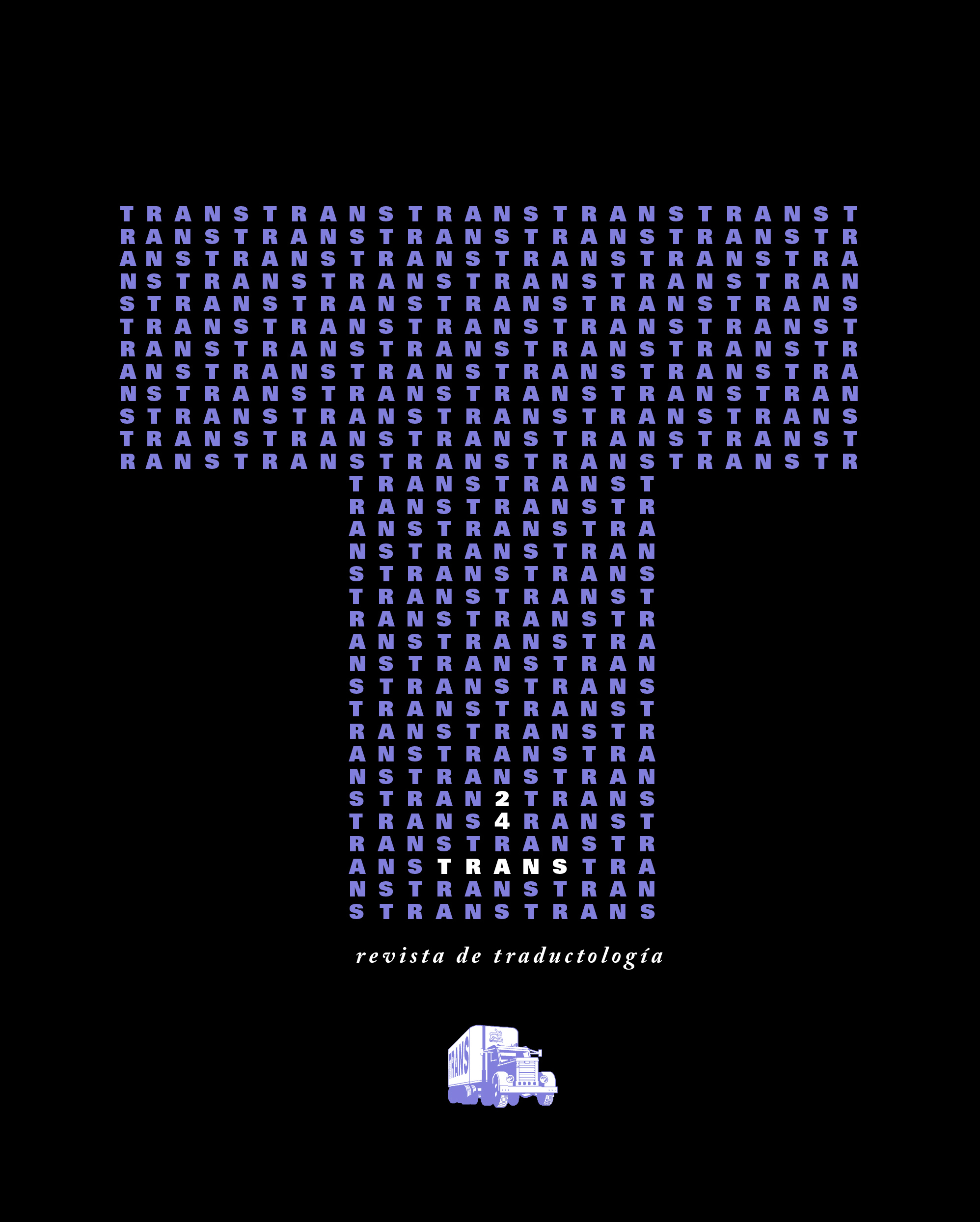Between Strangeness and Natural Equivalences: Translating Lorine Niedecker’s Experimental Poetry
DOI:
https://doi.org/10.24310/TRANS.2020.v0i24.8028Palabras clave:
Traducción de poesía, poesía experimental, extrañeza, aproximación literal, técnicas de traducciónResumen
This paper shows how my translations of objetivist American poet Lorine Niedecker for the bilingual volume Y el lugar era agua: Antología poética, published in 2018, have constantly sought for natural Spanish equivalences in sound and rhythm while trying, through different translating and rhetorical techniques, to keep the tone of strangeness that a more literal approach to the translation (after Walter Benjamin's reflections on the translation of experimental poetry) would render. To this end, specific translation uses (punctuation sings such as the long dash and other visual display elements, paraphrasing and amplification, homophony, alliteration, and techniques for the reproduction of a sustained tone in the target text) will be explained with respect to the translation choices for some of the most successful poems of the author. Far from definitive, the conclusions for such an approach to the translation of experimental poetry, intrinsic in the poems analyzed, give at least evidence of the constant oscillation between the two extremes of making a poem sound natural in the translation, at the same time that its linguistic strangeness is exposed. More importantly, they connect with the predominant views and practices about how to translate twentieth-century Anglo-American experimental poetry for twenty first-century Spanish readers.
Descargas
Métricas
Publicación Facts
Perfil de revisores N/D
Información adicional autores
Indexado: {$indexList}
-
Indexado en
- Sociedad Académica/Grupo
- N/D
- Editora:
- Universidad de Málaga
Citas
Armantrout, Rae (2007): «Darkinfested», in Collected Prose. San Diego: Singing Horse Press, 63-72.
Armantrout, Rae (2007): «Feminist Poetics and the Meaning of Clarity», in Collected Prose. San Diego: Singing Horse Press, 38-48.
Augustine, Jane (1982): «The Evolution of Matter: Lorine Niedecker’s Aesthetic», Sagetrieb, 1, 277-284.
Augustine, Jane (1996): «What’s Wrong with Marriage: Lorine Niedecker’s Struggle with Gender Roles», in Jenny Penberthy (ed.) Lorine Niedecker: Woman and Poet. Orono, Maine: National Poetry Foundation, 139-156.
Benjamin, Walter (1997): «The Translator’s Task», TTR, 10:2, 151-165.
Blau Duplessis, Rachel (1996): «Lorine Niedecker, the Anonymous: Gender, Class, Genre and Resistances», in Jenny Penberthy (ed.) Lorine Niedecker: Woman and Poet. Orono, Maine: National Poetry Foundation, 113-137.
Carbajosa , Natalia (2016): «Las Brontë tenían sus páramos, yo tengo mis marjales: La poesía en el agua de Lorine Niedecker», Jotdown, <https://www.jotdown.es/2016/02/las-bronte-tenian-sus-paramos-yo-tengo-mis-marjales-la-poesia-en-el-agua-de-lorine-niedecker/>.
Crase, Douglas (2013): «Niedecker and the Evolutionary Sublime», in Lorine Niedecker: Lake Superior, Seattle, Wave Books, 28-48.
DekovEn, Marianne (1989): «Male Signature, Female Aesthetic: The Gender Politics of Experimental Writing», in Ellen G. Friedman & Miriam Fuchs (eds.), Breaking the Sequence: Women’s Experimental Fiction, Princeton, Princeton University Press, 72-81.
Lemardeley Marie-Christine (2007): «Poetry, Poverty, Property: Lorine Niedecker’s Quiet Revelations», EREA, 5:1, 7-13.
Middleton, Peter (1997): «Lorine Niedecker’s ‘Folk-base’ and Her Challenge to American Avant-Garde», Journal of American Studies, 31:2, 203-18.
Monstruos en su laberinto: Poesía y traducción (2006): Carlos Jiménez arribas , «Traducción y contemporaneidad: La lengua en acto»; Jordi Doce: «Traducir: Teoría»; Miguel Casado: «La experiencia de lo extranjero» <http://www.dvdediciones.com
/monstruos_poesiaytraduccion.html>.
Niedecker, Lorine (2018): Y el lugar era agua: Antología poética, tr. Natalia Carbajosa, León: Ediciones Eolas.
Penberthy, Jenny (1993): Niedecker and the Correspondence with Zukofsky 1931-1970. Cambridge: Cambridge University Press.
Penberthy, Jenny (2002): Lorine Niedecker: Collected Works, Stanford: University of California Press.
Publicado
Cómo citar
Número
Sección
Licencia
Derechos de autor 2020 TRANS. Revista de Traductología

Esta obra está bajo una licencia internacional Creative Commons Atribución-NoComercial-CompartirIgual 4.0.
Todos los contenidos publicados en TRANS. Revista de Traductología están sujetos a la licencia Creative Commons Reconocimento-NoComercia-Compartirigual 4.0 cuyo texto completo puede consultar en <http://creativecommons.org/licenses/by-nc-sa/4.0>
Se pueden copiar, usar, difundir, transmitir y exponer públicamente, siempre que:
- Se cite la autoría y la fuente original de su publicación (revista, editorial y URL de la obra).
- No se usen para fines comerciales.
- Se mencione la existencia y especificaciones de esta licencia de uso.
- Compartir Igual — Si remezcla, transforma o construye sobre el material, debe distribuir sus contribuciones bajo la misma licencia que el original.
Los derechos de autor son de dos clases: morales y patrimoniales. Los derechos morales son prerrogativas perpetuas, irrenunciables, intransferibles, inalienables, inembargables e imprescriptibles. De acuerdo con la legislación de derechos de autor, TRANS. Revista de Traductología reconoce y respeta el derecho moral de los autores/as, así como la titularidad del derecho patrimonial, el cual será cedido a la Universidad de Málaga para su difusión en acceso abierto. Los derechos patrimoniales, se refieren a los beneficios que se obtienen por el uso o divulgación de las obras. TRANS. Revista de Traductología se publica en open access y queda autorizada en exclusiva para realizar u autorizar por cualquier medio el uso, distribución, divulgación, reproducción, adaptación, traducción o transformación de la obra.
Es responsabilidad de los autores/as obtener los permisos necesarios de las imágenes que están sujetas a derechos de autor.
Los autores/as cuyas contribuciones sean aceptadas para su publicación en esta revista conservarán el derecho no exclusivo de utilizar sus
contribuciones con fines académicos, de investigación y educativos, incluyendo el auto-archivo o depósito en repositorios de acceso abierto de cualquier tipo.













21.png)
